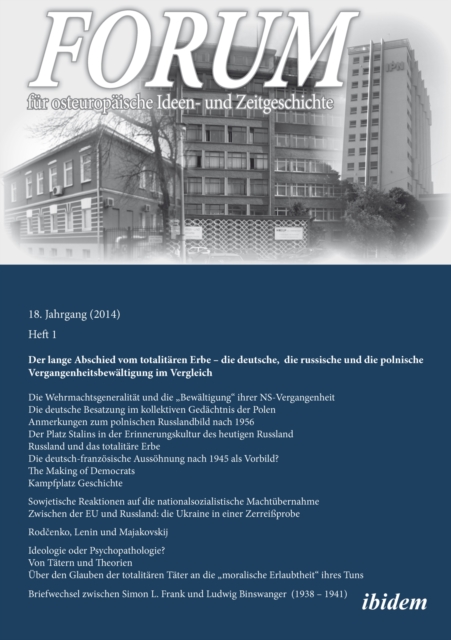CITESTE MAI MULT
Detalii
Descriere RO
Forum features interdisciplinary discussions by political scientists--literary, legal, and economic scholars--and philosophers on the history of ideas, and it reviews books on Central and Eastern European history. Through the translation and publication of documents and contributions from Russian, Polish, and Czech researchers, the journal offers Western readers critical insight into scientific discourses across Eastern Europe. This issue compares the specifics of German memory culture with those of Eastern European countries, specifically Poland and Russia, since the beginning of de-Stalinization.
Since 1997, FORUM is an integral part of the journal landscape of European Studies. In addition to facts of contemporary history, it offers deep insights into the history of ideas, reflects current discussions, and provides reviews of books on Central and Eastern European history. Especially on the history of ideas and contemporary history it offers more than ›just‹ history--e.g. interdisciplinary discussions by political scientists, literary, legal, and economic scholars and philosophers. FORUM sees itself as a bridge between East and West. Through the translation and publication of documents and contributions from Russian, Polish, and Czech researchers it offers the Western reader insight into the scientific discourse within Eastern Europe.Volume 18, Issue 1: The way the Federal Republic of Germany dealt with its past is seen by some as a role model for many post-authoritarian and post-totalitarian transition countries in East and West, despite some downsides of the long process of coping with the past after the German ›zero hour‹. The current FORUM issue focuses on the comparison of the specifics of German memory culture with those of the Eastern European countries, especially Poland and Russia, since the beginning of their de-Stalinization debates.Seit 1997 ist das FORUM fester Bestandteil der Zeitschriftenlandschaft der Osteuropaforschung. Neben Fakten der Zeitgeschichte bietet es tiefe Einblicke in die Ideengeschichte, spiegelt aktuelle Diskussionen wider und liefert Rezensionen zu Werken der mittel- und osteuropaischen Zeitgeschichte. Gerade in den Rubriken Ideengeschichte und Zeitgeschichte bietet es mehr als -nur- Geschichte - facherubergreifend kommen u.a. Politologen, Literatur-, Rechts- und Wirtschaftswissenschaftler sowie Philosophen zu Wort. Das FORUM versteht sich als Brucke zwischen Ost und West. Durch die Ubersetzung und Veroffentlichung von Dokumenten und Beitragen aus dem Russischen, Polnischen und Tschechischen bietet es dem westlichen Leser Einblicke in den wissenschaftlichen Diskurs Osteuropas. Heft 1/2014: Der lange Abschied vom totalitaren Erbe Das Modell der bundesrepublikanischen Vergangenheitsbewaltigung gilt als Vorbild fur viele postautoritare bzw. posttotalitare Transformationsstaaten in Ost und West, ungeachtet mancher Schattenseiten des langwierigen Prozesses der deutschen Vergangenheitsbewaltigung nach der -Stunde Null-. Das aktuelle Forum-Heft vergleicht in seinem thematischen Schwerpunkt die Spezifika der deutschen Erinnerungskultur mit denjenigen der osteuropaischen Lander, vor allem Polens und Russlands, seit dem Beginn der Entstalinisierungsdebatten.
Edituraibidem-Verlag, Jessica Haunschild u Christian Schon
Dimensiuni150 x 210 x 20
Data Publicarii08/12/2021
Format
Necartonata
Numar pagini330
Aceasta este o carte in limba engleza. Descrierea cartii (tradusa din engleza cu Google Translate) este in limba romana din motive legale.
Forumul prezinta discutii interdisciplinare ale politologilor - carturari literari, juridici si economici - si filosofi cu privire la istoria ideilor si revizuieste carti despre istoria Europei Centrale si de Est. Prin traducerea si publicarea de documente si contributii ale cercetatorilor rusi, polonezi si cehi, revista ofera cititorilor occidentali o perspectiva critica asupra discursurilor stiintifice din Europa de Est.

